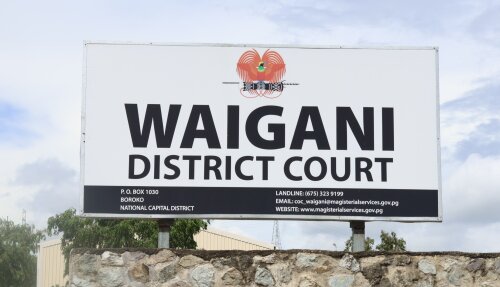Best Restructuring & Insolvency Lawyers in Port Moresby
Share your needs with us, get contacted by law firms.
Free. Takes 2 min.
List of the best lawyers in Port Moresby, Papua New Guinea
About Restructuring & Insolvency Law in Port Moresby, Papua New Guinea
Restructuring and insolvency law in Port Moresby, Papua New Guinea is designed to address the financial distress of businesses and individuals. These legal processes provide a structured way for debtors to address their financial challenges, satisfy creditors where possible, and, in some cases, allow for a fresh start or a chance to continue business operations. Papua New Guinea’s legal framework for insolvency and corporate restructuring seeks to balance fair treatment of creditors with opportunities for the revival or orderly closure of struggling businesses. The legal system in Port Moresby, being the country’s primary commercial center, sees a range of insolvency and restructuring matters, from small local enterprises to large corporate entities.
Why You May Need a Lawyer
Several common situations can arise where professional legal advice becomes essential in restructuring and insolvency matters:
- Your business is unable to pay its debts as they fall due and you are considering liquidation or administration.
- You are seeking to restructure or renegotiate existing debt arrangements to continue business operations.
- You have received a statutory demand or winding up application from a creditor.
- You are a creditor and want to understand your rights in an insolvency or restructuring process.
- You are concerned about directors’ duties and potential liabilities during financial distress.
- You need guidance on voluntary administration, receivership, or other formal insolvency proceedings.
- You own or manage a business involved in cross-border transactions and need to understand how PNG insolvency law applies.
A lawyer with expertise in restructuring and insolvency can help you understand complex legal obligations, protect your interests, navigate negotiations with creditors, and ensure compliance with statutory requirements. Early legal advice can often help stabilize financial positions and avoid unnecessary personal or corporate risks.
Local Laws Overview
The restructuring and insolvency laws in Port Moresby, and Papua New Guinea more broadly, are primarily governed by the Companies Act 1997 and the Insolvency Act. These laws set out the procedures for entering into voluntary administration, creditors’ arrangements, liquidation, and bankruptcy. Key considerations in the local context include the role and appointment of liquidators or administrators, the treatment of secured versus unsecured creditors, the initiation of winding up proceedings, and the legal obligations of company directors during insolvency.
Some notable aspects of PNG's insolvency regime include:
- Directors’ duties to prevent insolvent trading and the potential for personal liability if these duties are breached.
- Clear procedural requirements for lodging and adjudicating creditor claims.
- The ability for both voluntary and court-ordered liquidation processes.
- Creditors’ rights to vote on major restructuring decisions.
- The involvement of regulatory and government bodies in overseeing insolvency professionals and compliance.
- Recognition of cross-border insolvency cases under certain circumstances.
Frequently Asked Questions
What is the difference between restructuring and insolvency?
Restructuring involves reorganizing a company’s finances and operations to address financial difficulties and avoid insolvency. Insolvency refers to the legal process when an individual or company cannot pay its debts as they fall due.
What laws govern insolvency in Papua New Guinea?
The main laws are the Companies Act 1997 and the Insolvency Act, along with related regulations and case law.
Who can initiate insolvency proceedings in Port Moresby?
Insolvency can be initiated by the debtor themselves, by a creditor, or by the court in response to an application.
Can directors be held personally liable for company debts?
Yes, if directors continue to allow a company to trade while insolvent, they might be found personally liable for losses under the Companies Act.
What is voluntary administration?
Voluntary administration is a process where an external administrator is appointed to assess the company’s affairs and develop options for restructuring or liquidation.
What role do creditors play in the insolvency process?
Creditors may vote on key decisions, submit claims for debts owed, and sometimes nominate or replace liquidators or administrators.
Are employees’ entitlements protected during insolvency?
Employees generally have priority claims over certain entitlements like wages and leave, paid out from available assets ahead of unsecured creditors.
How long does the insolvency process typically take in Port Moresby?
Timelines vary depending on the complexity of the matter, but liquidation or administration can take months or, in complex cases, several years.
What can I do if I am owed money by an insolvent company?
You should lodge a proof of debt with the liquidator or administrator and monitor distribution outcomes. Legal advice can help protect your rights and maximize potential recovery.
How can I find a qualified insolvency lawyer in Port Moresby?
You can contact the Papua New Guinea Law Society, seek recommendations from business networks, or search for reputable law firms with insolvency expertise based in Port Moresby.
Additional Resources
If you are seeking further information or assistance regarding restructuring and insolvency in Port Moresby, consider the following resources:
- Papua New Guinea Law Society - for a list of qualified local lawyers
- Investment Promotion Authority (IPA) - for company information and regulatory guidance
- Office of the Registrar of Companies - for official records on business registrations and insolvency filings
- Insolvency practitioners and chartered accounting firms in Port Moresby - for specialized insolvency services
- Court registry and local commercial courts - for case information and procedural assistance
Next Steps
If you believe you may be facing restructuring or insolvency issues or are owed money by a struggling debtor, here are the recommended steps:
- Gather all relevant information and documents related to your finances, business debts, and creditor communications.
- Seek early legal advice from a lawyer experienced in Papua New Guinea’s insolvency laws. This can help clarify your options and risks.
- If relevant, consult with a licensed insolvency practitioner or accountant for specialist financial and process advice.
- Respond promptly to any official notices or demands, as delays can worsen your position.
- Consider negotiation or mediation as alternatives to formal court processes, if appropriate for your situation.
Taking timely and informed action with the help of qualified professionals will give you the best chance of protecting your interests and achieving a favorable outcome under Papua New Guinea’s restructuring and insolvency laws.
Lawzana helps you find the best lawyers and law firms in Port Moresby through a curated and pre-screened list of qualified legal professionals. Our platform offers rankings and detailed profiles of attorneys and law firms, allowing you to compare based on practice areas, including Restructuring & Insolvency, experience, and client feedback.
Each profile includes a description of the firm's areas of practice, client reviews, team members and partners, year of establishment, spoken languages, office locations, contact information, social media presence, and any published articles or resources. Most firms on our platform speak English and are experienced in both local and international legal matters.
Get a quote from top-rated law firms in Port Moresby, Papua New Guinea — quickly, securely, and without unnecessary hassle.
Disclaimer:
The information provided on this page is for general informational purposes only and does not constitute legal advice. While we strive to ensure the accuracy and relevance of the content, legal information may change over time, and interpretations of the law can vary. You should always consult with a qualified legal professional for advice specific to your situation.
We disclaim all liability for actions taken or not taken based on the content of this page. If you believe any information is incorrect or outdated, please contact us, and we will review and update it where appropriate.














